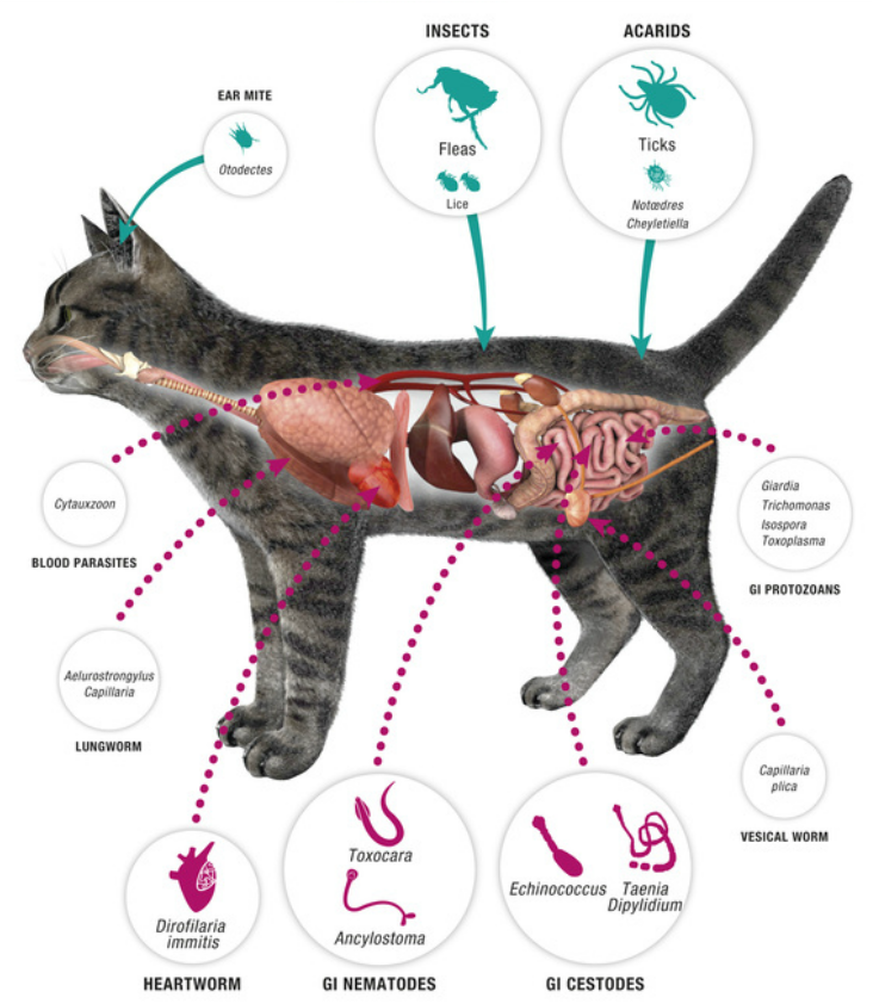Dr Jo Blogs
Expert Cat Care Advice
Common parasites of cats
Fleas, Ticks & Worms - Oh my!
Dr Jo Lewis MRCVS | 13 Sep 2021 | 5 min read
Share:
Fleas |
Ticks |
|
Fleas are the most common cat parasites and can cause irritation, allergic reactions, blood loss anaemia and transmit tapeworms. Fleas can also spread diseases to people. Find out more
WormsOne in four cats carries intestinal worms and heavy worm infestations can cause fatal complications in kittens. Find out more
|
Cats also often catch ticks, but these are more difficult to detect and they are often removed before you notice them when cats groom themselves. Find out more
Harvest MitesThe six-legged larvae of harvest mites feed on tissue fluid & often cause considerable skin itching & discomfort in the late summer - autumn. Find out more
|
Why should I treat my cats for parasites?
The presence of fleas, ticks and worms in cats causes disease in cats but can also be a risk for humans, especially children.
More specifically, the possible consequences of not treating for external parasites like fleas and ticks include:
* parasites that have adverse affects on human health too
More specifically, the possible consequences of not treating for external parasites like fleas and ticks include:
- Flea Bite Hypersensitivity (an allergic skin disease associated with fleas. A single flea bite can cause widespread itchiness for 6 weeks)
- Transmission of tapeworm (Dipylidium caninum) via fleas *
- Blood loss anaemia and iron deficiency (particularly kittens) - potentially fatal
- Feline infectious anaemia (Mycoplasma haemofelis infection) *
- Transfer of tick borne diseases such as Babesiosis, Ehrlichiosis & Lyme disease (Borreliosis) *
- Infestation of the house and garden
* parasites that have adverse affects on human health too
Cats with access to the outdoors, whether or not they hunt, can have worms without showing any symptoms. Without using regular parasite control treatment on your cat, your family are at risk of infection-related disease. The consequences of untreated internal parasites (worms) include:
Problems caused by parasite infection for cats:
Problems caused by parasite infection for cats:
- Weight loss
- Gut signs (vomiting, diarrhoea)
- Anaemia
- Itchiness or irritation around the anus
- Kittens with worms may fail to thrive or have a pot-bellied appearance
Transmission of parasites from cats to humans:
Young children are particularly at risk of contracting worms as they do not wash their hands and often put things in their mouth. Toxocariasis (caused by roundworm) is particularly dangerous as the worms can migrate into organs such as the eyes (causing blindness) and sometimes other major organs like the brain, heart, liver and lungs. Other parasites like fleas or ticks can transmit blood-borne pathogens that cause illnesses such as fleas carrying Bartonella henselae and causing human Cat Scratch disease.
Young children are particularly at risk of contracting worms as they do not wash their hands and often put things in their mouth. Toxocariasis (caused by roundworm) is particularly dangerous as the worms can migrate into organs such as the eyes (causing blindness) and sometimes other major organs like the brain, heart, liver and lungs. Other parasites like fleas or ticks can transmit blood-borne pathogens that cause illnesses such as fleas carrying Bartonella henselae and causing human Cat Scratch disease.
How often should I treat for parasites?
Cats can pick up fleas, ticks and worms throughout the year, becoming re-infested whenever they are exposed to a contaminated environment. Each cat’s risk of exposure depends on his/her lifestyle, the time of year and the presence of other cats. I issue my clients with a "Getting To Know You & Your Cat Questionnaire" when they register with my practice, which among other things helps me to advise on the right level of parasite and vaccine protection for each family and their cat(s).
This personal approach means that each client gets a parasite control schedule that is as individual as their cat's and their family's lifestyle. It’s really important to remember that it’s not enough just to treat cats once against parasites, they need regular protection throughout the year and the interval between treatments and the type of product used will depend on the factors above.
From time to time cats encounter other parasites, particularly those who may have travelled overseas or come from environments where cats have been housed in large numbers. If you're travelling outside your local area always check with your vet whether your current parasite control is up to the task.
This personal approach means that each client gets a parasite control schedule that is as individual as their cat's and their family's lifestyle. It’s really important to remember that it’s not enough just to treat cats once against parasites, they need regular protection throughout the year and the interval between treatments and the type of product used will depend on the factors above.
From time to time cats encounter other parasites, particularly those who may have travelled overseas or come from environments where cats have been housed in large numbers. If you're travelling outside your local area always check with your vet whether your current parasite control is up to the task.
WARNING: Products containing PERMETHRIN KILL CATS!
Here's a link to a list of flea/tick control products that,
if used accidentally on cats, can be fatal
These products are intended for the treatment of fleas and ticks on dogs only. They contain permethrin, a substance that is safe for dogs but causes a toxic reaction in cats when present in spot-on products, due to its concentration. Cats treated with even small amounts of spot-on products containing permethrin, or allowed to groom dogs treated with any of the products in the list above, can develop nervous signs such as depression, drooling, tremors, seizures, vomiting and staggering, and may die.
Some pet owners apply spot-on products containing permethrin that are indicated for use in dogs to their cats by mistake, or because they think that it is safe if they use only small amounts of the product. It is not safe to use any spot-on product containing permethrin in cats. If you have applied any of the products listed above to your cat, it is important to wash off the product from the cat with water and a mild detergent and seek immediate treatment from your veterinary surgeon. Take the product package with you and show it to the vet.
The VMD (Veterinary Medicines Directorate) is actively monitoring the incidence of suspected adverse reactions to these products and requests that any incident be reported as soon as possible. Details of how to report a suspected adverse reaction can be found here.
NB: The dilute concentration of permethrin in some environmental sprays is acceptable but only when used strictly to the packaging's recommendations (eg cats prevented from exposure to the product until the product has dried). Again always check that the house spray you are using is designed for use around cats.
Some pet owners apply spot-on products containing permethrin that are indicated for use in dogs to their cats by mistake, or because they think that it is safe if they use only small amounts of the product. It is not safe to use any spot-on product containing permethrin in cats. If you have applied any of the products listed above to your cat, it is important to wash off the product from the cat with water and a mild detergent and seek immediate treatment from your veterinary surgeon. Take the product package with you and show it to the vet.
The VMD (Veterinary Medicines Directorate) is actively monitoring the incidence of suspected adverse reactions to these products and requests that any incident be reported as soon as possible. Details of how to report a suspected adverse reaction can be found here.
NB: The dilute concentration of permethrin in some environmental sprays is acceptable but only when used strictly to the packaging's recommendations (eg cats prevented from exposure to the product until the product has dried). Again always check that the house spray you are using is designed for use around cats.






